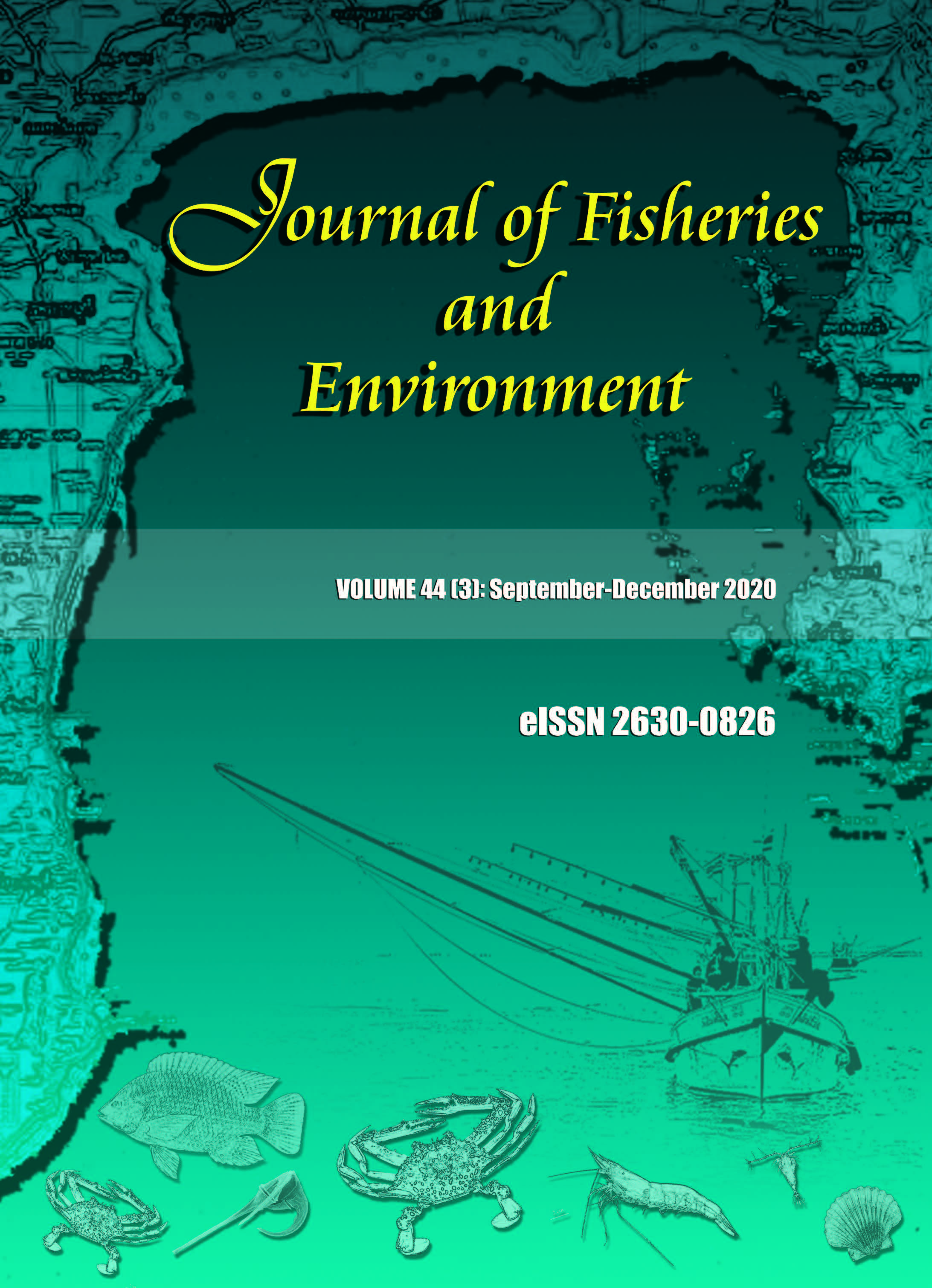Marine Tourism Predicament in Andaman Sea from Declining Biotic and Water Quality
Main Article Content
Abstract
Thailand’s marine tourism relies heavily on pristine environments; hence, preservation of environmental quality is vital for sustainable tourism. In this study, tourist activities, perceptions and satisfactions with marine environmental condition were examined by questionnaire survey at the island province of Phuket, and two nearby marine national parks (Phi Phi and Surin) to cover high to low tourist intensities (2,032 survey responses). Two tourist groups were identified based on the main purpose of their visit and activities undertaken: underwater experience explorers (Surin) and those visiting principally for rest and relaxation (Phuket and Phi Phi). Environmental data such as coral condition, fish species and fish quantity were collected by line intercept and belt transect techniques while water quality parameters such as dissolved inorganic nitrogen, dissolved inorganic phosphorus and total suspended solids were analysed in the laboratory. Environmental data indicated that water quality and underwater biotic characteristics decreased with increasing level of tourist intensity. Satisfaction declined with declining quality of water (increasing pollution level) (r2 = -0.18, -0.21, -0.32 for dissolved nitrogen, dissolved phosphorus and total suspended solids, respectively; n = 1,683; p<0.01). However, level of satisfaction increased with increasing quality of coral, fish variety and fish quantity (r2 = 0.34, 0.29, 0.25; n = 1,698; p<0.01). Thai and foreign tourists responded differently to questions regarding a hypothetical decline in reef quality (real or perceived) in the future; Thai tourists would contribute to resource restoration through involvement in conservation projects, while international tourists would change their destination. The implication is that the sustainability of Thai marine-based tourism is vulnerable to a decline in tourist satisfaction with the quality of reefs. Given the economic importance of international tourism to Thailand, the study area’s tourism dependency on quality marine experiences, and its declining reef quality, efforts to abate existing anthropogenic threats to reefs must be a priority.
Article Details
References
Akama, J.S. and D. Kieti. 2007. Tourism and socio-economic development in developing countries: A case study of Mombasa resort in Kenya. Journal of Sustainable Tourism 15(6): 735-748.
Bigne, J., M.I. Sanchez and J. Sanchez. 2001. Tourism image, evaluation variables and after purchase behaviour: inter-relationship. Tourism Management 22(6): 607-616.
Buckley, R. and J. Pannell. 1990. Environmental impacts of tourism and recreation in national parks and conservation reserves. The Journal of Tourism Studies 1(1): 24-32.
Department of National Parks (DNP). 2020. Tourism statistic. Department of National Parks, Wildlife and Plant Conservation (DNP). http://portal.dnp.go.th/Content/nationalpark?contentId=20014. Cited 27 Jul 2020.
English, S., C.R. Wilkinson and V. Baker. 1997. Survey Manual for Tropical Marine Resources, 2nd ed. Australian Institute of Marine Science. Townsville. 390 pp.
Fabricius, K.E., G. De'ath, L. McCook, E. Turak, and D. M. Williams. 2005. Changes in algal, coral and fish assemblages along water quality gradients on the inshore Great Barrier Reef. Marine Pollution Bulletin 51(1-4): 384-398.
Fabricius, K.E. and D. McCorry. 2006. Changes in octocoral communities and benthic cover along a water quality gradient in the reefs of Hong Kong. Marine Pollution Bulletin 52(1): 22-33.
Green, R. 2005. Community perceptions of environmental and social change and tourism development on the island of Koh Samui, Thailand. Journal of Environmental Psychology 25(1): 37-56.
Henkel, R., P. Henkel, W. Agrusa, J. Agrusa and J. Tanner. 2006. Thailand as a tourist destination: Perceptions of international visitors and Thai residents. Asia Pacific Journal of Tourism Research 11(3): 269-287.
Inskeep, E. 1991. Tourism Planning: An Integrated and Sustainable Development Approach. John Wiley and Sons. Canada. 528 pp.
Lundie, S., L. Dwyer and P. Forsyth. 2007. Environmental-economic measures of tourism yield. Journal of Sustainable Tourism 15(5): 503-519.
Lynn, N.A. and R.D. Brown. 2003. Effect of recreational use of impacts on hiking experiences in natural areas. Landscape and Urban Planning 64: 77-87.
Mason, P. 2008. Tourism Impacts, Planning and Management, 2nd ed. Sydney: Butterworth Heinemann. 289 pp.
Middleton, V.T.C. 1997. Sustainable tourism: A marketing perspective. In: Tourism sustainability: Principles to practice. (ed. M.J. Stabler), pp. 129-142. CAB International, New York.
Ministry of Tourism and Sports (MOTS). 2020. Tourism statistic. https://www.mots.go.th/News-link.php?nid=12092. Cited 27 Jul 2020.
Petrosillo, I., G. Zurlini, M.E. Corliano, N. Zaccarelli and M. Dadamo. 2007. Tourist perception of recreational environment and management in a marine protected area. Landscape and Urban Planning 79(1): 29-37.
Reopanichkul, P., R.W. Carter, C.J. Crossland and S. Worachananant. 2010. Wastewater discharge degrades coastal waters and reef communities. Marine Environmental Research 69: 287-296.
Rittichainuwat, B.N., H. Qu and T.J. Brown. 2001. Thailand's international travel image. Cornell Hotel and Restaurant Administration Quarterly 42(2): 82-95.
Rouphael, A.B. and G. J. Inglis. 2001. Take only photographs and leave only footprints? An experimental study of the impacts of underwater photographers on coral reef dive sites. Biological Conservation 100(3): 281-287.
Tourism Authority of Thailand (TAT). 2016. Phuket. Tourist Information Division. Bangkok, Thailand. 46 pp.
Tourism Authority of Thailand (TAT). 2018. Wonderful Diving in Thailand. Promotional
Material Production Division, Marketing Services Department. Bangkok, Thailand. 5 pp.
Worachananant, S., R.W. Carter, M. Hockings and P. Reopanichkul. 2008. Managing the impacts of SCUBA divers on Thailand's coral reefs. Journal of Sustainable Tourism 16(6): 645-663.
World Travel & Tourism Council (WTTC). 2016. Travel & Tourism: Economic Impact. UK. 17 pp.


